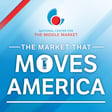Introduction to 'The Market That Moves America'
00:00:02
Speaker
Welcome to The Market That Moves America, a podcast from the National Center for the Middle Market. The center is the leading source of knowledge, leadership and innovative research on the middle market economy. Throughout our podcast, we will feature middle market leaders and stakeholders to hear their real world perspectives on trends and emerging issues.
Importance of Intellectual Property for Middle Market Companies
00:00:22
Speaker
Intellectual property is an important yet easy to overlook area for most middle market companies. Copyrights, trademarks, logos, and brands can be infringed no matter the size of the organization. Hear from an NCMM member specializing in helping middle market companies protect these valuable assets. Welcome to the Market That Moves America. I'm Doug Farin, Managing Director of the Ohio State University Fisher College of Business National Center for the Middle Market.
Introduction to Harness IP and Key Representatives
00:00:52
Speaker
We're pleased today to talk about a subject that we've never really touched on in this podcast series, which is intellectual property. And joining me today are two representatives from one of our member companies, Harness IP.
00:01:09
Speaker
Harness IP is a full service intellectual property firm focusing on patents, trademarks, IP, trade secrets, and much, much more. So I'd like to welcome Brian Wheelock and Joe Walsh to the podcast. Brian, Joe, welcome. Thank you, Doug. Yeah, thanks, Doug. So before we get started, I'd like to have each of you just tell me a little bit more about each of your individual backgrounds, kind of your
00:01:37
Speaker
your prior experience, and then what you're currently doing, your current role at Harness IP. I believe you're both out of the St. Louis office, correct? Yeah, that's correct. Okay. Yeah. Brian, would you mind going first? No. Who doesn't like to talk about themselves? I have a mechanical engineering degree with also major in material science that I got from Duke University a long time ago.
00:02:03
Speaker
and my law degrees from Washington University here in St. Louis. And ever since graduating law school, I've been practicing at various intellectual property law firms here in St. Louis for now over 40 years. It's amazing to say that. And over the years, I've pretty much touched every area of IP from while I was a litigator and then patent prosecutor, trademarks.
00:02:30
Speaker
Now I kind of do just kind of the miscellaneous of things and just provide backup for any kind of oddball IP situations that come up. I also teach in electrical property law at Washington University where I graduated from. I teach a patent course and a trademark course and an IP litigation course. Wonderful.
Journey and Global Reach of Harness IP
00:02:51
Speaker
Yeah, so this is Joe. So Brian is really considered kind of like the elder statesman of intellectual property law, certainly in the St. Louis region, but he's known nationally and internationally as well. So he's somewhat humble, but the guy has an answer, at least a good lead on any sort of intellectual property question you might have.
00:03:10
Speaker
So I'll tell you a little bit about my background, Doug. Brian and I are both from the East Coast originally. He's from New Jersey. I'm from New York. My background is in chemistry. I came out to St. Louis to attend law school, graduated law school, and then worked for a large general practice firm here in St. Louis for a little bit, but then moved on to Dallas, Texas, where I joined an oil company and was in-house patent counsel there for six years.
00:03:37
Speaker
And that gave me some real insight into how businesses operate, how they make decisions, who's involved in making the decisions, and how critical intellectual property was back then and increasingly has become to companies.
00:03:54
Speaker
So and much like Brian, our firm is I think we're consistently ranked in the top 10, usually like number six in in the United States out of all firms who do intellectual property. So we get more patents and trademark registrations issued every year than most any other firm in the country. And it's all we do. We don't do banking or real estate or
00:04:16
Speaker
you know, dog bite cases or anything like that. We do only patents, trademarks, related litigation and licensing and trade secrets. And we do it throughout the world. We have a sophisticated network of associates in every one of the 160 industrialized countries throughout the world.
00:04:32
Speaker
We know these people personally, so when our clients come to us and say, hey, I've got intellectual property that I need to protect in the United States, but then also there are 10 countries throughout the world that this is important for us. We can certainly help them in all those 10 countries or any other country in the world that is of interest to them.
00:04:51
Speaker
So Brian and I are kind of two of the rarer guys in our firm because we handle all forms of intellectual property. And you know, intellectual property is kind of a somewhat intimidating term to a lot of people. They don't know really what it is, but you know, we protect inventions, we protect brands, we protect secrets that give businesses competitive advantage, and we litigate that stuff as well. So that's our background and we're really happy to be here. Thanks for having us Doug.
00:05:20
Speaker
Yeah, very interesting. So I mean, it sounds like I'm in great hands for this conversation. As I mentioned at the top, you know, intellectual property is not a topic that comes up a lot, certainly in the work that we've done over the 12 years here at the center. But as you just pointed out, I mean, it's important for a number of reasons. So could you both tell me as, you know, as a starting point, why does hot harness IP
Why IP Matters for Middle Market Success
00:05:48
Speaker
view the middle market as an ideal target customer for your firm.
00:05:53
Speaker
I think it's because these companies need our help the most. Startup companies need help, but they have lots of issues. And the established large companies, they have in-house people. We get to help them, but it's always a helper role. But these companies often don't have the internal resources and people watching their IP and need to help the most. So that's why we think it's a good target.
00:06:19
Speaker
And selfishly, it's also the most fun for us because that's where we can really make a big difference. We're just another cog in the wheel at one of our big clients, and we're happy to be cogs in wheels. But there we can make a business-changing contribution. And that's fun. Who doesn't want to do that?
00:06:41
Speaker
Yeah, I couldn't agree with Brian Moore. The middle market region is the region where intellectual property... I tell people all the time, if you look back 30 years and ask a CEO what his most prized and valuable assets were, he would say, certainly my people and maybe my plant, probably the plant. But you fast forward to today and the people, most of them aren't in it for the gold watch, they're not around.
00:07:08
Speaker
you know till retirement and the plant might be in you know some some place in asia may not be here in the u.s and if it is it's a smaller size facility with operations you know outside the the country so today it's intellectual property what it is that enables you to effectively compete against you know the the big the you know whoever it is that's uh uh selling products that compete with your products and intellectual property as we'll get into is the way to
00:07:35
Speaker
give you a competitive edge against your competitors. So intellectual property is more important today than ever before, and it's especially important to the middle market. As Brian said, the multinationals, the $500 billion a year companies, they have it well protected. They use us to handle a lot of their day-to-day stuff, but they have in-house people who guide them and steer them and help them along the way.
00:08:00
Speaker
The small startups are struggling with all kinds of issues and usually don't have a lot of money for intellectual property. But the middle market guys are the guys who are really, they actually contribute the most to the GNP and they really need intellectual property help. And it's extremely gratifying to see, you know, our contributions translate into
00:08:18
Speaker
increase market share or win in a major lawsuit that keeps that business alive or enables them to capture more market share. So middle market I think is a huge target for us and we absolutely delight when we get a new middle market client.
Educating Leadership on IP Protection
00:08:34
Speaker
Yeah, Joe, I think you mentioned at the top that intellectual property is widely misunderstood or not many people understand it well. Do you get the sense that the leadership teams at these mid-sized businesses actually have an understanding or do you find yourself
00:08:50
Speaker
not only working with them to help protect and defend it, but educating them on it? Absolutely. We break it down. I think as you can tell from the short time that we've been having this conversation, Brian and I are real practical guys. We like to make things readily understandable to people. We're not going to talk over your head. We're not going to sell you something you don't need. We're going to really try to figure out how we can help you. Yeah.
00:09:15
Speaker
Yeah, we often say we use a phrase here at the center, you know, mid-sized companies have big company challenges with small company resources. So they often look at it. I mean, you probably live this, right? I mean, they're they're looking for trusted experts like yourselves to really help them out with this. As we think about, you know, kind of the future, what do you think are going to be some of the, I don't know, hot
00:09:42
Speaker
trends, opportunities, challenges that emerge. I'll throw one out there, for instance, artificial intelligence. We're seeing that popping up in every conversation that we're having, but I'd be curious on your perspective, what do you see in the future of this field?
00:09:59
Speaker
I think the challenge for any business, particularly the middle market, is differentiation. So what makes your company, your product, your service special? And so finding that thing that will attract and keep customers is the holy grail of running a business. But once you find that little nugget, the question is, how do we keep that nugget? How do we exploit it, yet make sure other people don't
00:10:27
Speaker
Take our nugget away from us intellectual property does you know if you make a new you made your product better got a new feature you think of it get a utility pattern on the course if you make the design better you know slicker looking and sleep.
00:10:43
Speaker
You know, there's design patents for that and maybe even trademark protection. If you've got better packaging, better literature, better instructions, that's a field of copyright. So there's protection for anything that your differentiator is. It's up to the company to do the creative part and it's up to us to make sure that it stays theirs.
00:11:06
Speaker
I think Brian is right on the target and to kind of add to that a little bit, Doug, one of the biggest challenges moving forward is in our careers, we've truly seen the markets for our clients go well beyond the borders of the United States.
00:11:23
Speaker
you know, Brian started 40 years ago, I've been at it for 36. Back then, you know, most American companies, unless you were a multinational, you know, did business within the territory of the United States. But today, you know, you've got operations throughout the world, you're selling around the world, there's all these different selling platforms. So you have to be, you know, you have to be aware of like, who's knocking you off and who's counterfeiting.
00:11:48
Speaker
your products and using your brands and so the challenge is how do you prevent other people from stealing your market share and counterfeiting your products and infringing your brands in markets that you hope to compete in or getting a foothold there but maybe these other people
00:12:10
Speaker
ran off and registered your brand in a different country and they got their first and they're claiming rights in it now because they, you know, they're very sophisticated counterintelligence firms now in these emerging markets throughout the world that actually look to the US for things that are developing here and then they try to protect it
00:12:32
Speaker
in their own country before the rightful owner has a chance to go over and do that. So that's a huge issue right now is trying to forecast where your business is going to go and where to protect your products and names and the shapes of your products, the way they work and all that sort of stuff throughout the world.
Copyright as an Equalizer for Mid-Size Firms
00:12:55
Speaker
Over the course of your careers, have either of you viewed technology as either like a beneficial asset toward intellectual property protection or does it create more risk and challenge?
00:13:09
Speaker
Man, that's a loaded question. But you can't stop technology, Doug. That's one thing. Right. Understood. I can remember as a kid watching George Jetson and thinking, wow, zooming around in the spacecrafts, going from place to place and all that. Well, I've really become a believer that if you can imagine it, it's possible. It can happen. We may get to the point where beam me up Scotty actually occurs where you can break everything down into
00:13:39
Speaker
you know, individual cells and then recreate it somewhere else. You know, so technology doesn't matter really what you think about it. It's here. It's not, you know, people's imaginations are as wild as you can imagine. And, you know, they're going to continue to come up with new and innovative things that, you know, drive us and keep, you know, keep us thinking and keep us inventing. So, so you can't really, you can't get too
00:14:08
Speaker
What's the right word for it? I don't think you can say it's not bad or good or whatever. It's technology and it's going to continue. You may have your views about certain aspects that you may not like or whatever, but you're not going to keep it in the can. It's going to keep marching forward. So you just have to, if you're not prepared to embrace it and understand it, then it just may run you over. Sure. Got it. So let's talk a little bit about copyrights.
00:14:36
Speaker
with mid-sized firms particularly, why do you guys feel it's important for them to understand the protections and benefits that can be offered by copyrights? I mean, you mentioned inventions and creations, but
00:14:50
Speaker
There's intellectual property within copy as well. So can you talk a little bit about that? Yeah, I'm going to jump into this one because it's one of my favorite topics and you know, as I may have said to you earlier, Doug, you know, I think copyright is the biggest bang for your buck in intellectual property. And it's also the great equalizer.
00:15:09
Speaker
because if you create an original work of authorship which can be something written, it can be your website, it can be product brochures or product instructions. If it's an original work, if somebody sat down and actually figured out how to string all these words together in an instruction form or
00:15:30
Speaker
in a brochure that's promotional in nature or to lay out your website or whatever, all that is a subject of copyright. And you can prevent other people from stealing it or from using it without your permission if you register the copyright. You don't have to register it. The copyright comes into existence automatically, but if you really want the benefit of copyright, spend the 65 bucks with the Library of Congress, which is what it costs to register a copyright,
00:15:56
Speaker
We will charge you probably 400 because we know how to do it and you're not going to do it the way we do it. And we know how to answer all the questions. But there is a form there that, you know, will tell you for each type of copyrightable work, there's a government form that will walk you through step by step. Just go to copyright.gov and you can see exactly what I'm talking about. There's for textual works, like a written, you know, document, there's form TA. And you can actually, huh?
00:16:24
Speaker
form TX and it'll why there's 20 steps in the form TX instruction form that tell you exactly how to fill out the form. So if you want to take the time to do it, we actually train our clients on how to do this too, because here's the thing.
00:16:39
Speaker
So you register, you're coming out with a new product and you've got a lot of promotional literature that is collateral stuff that's going to go out with the product. You've got a new website for it. You've got some videos. You've got instruction manuals and all that stuff. Register all the copyrights in that because if your competitors get a hold of that and they lift a substantial portion of it,
00:17:03
Speaker
If they lift a small amount of it, it's usually considered harmless and you really can't take action against them. But if it reaches a certain level, then it's copyright infringement if you haven't authorized them. And if you have that copyright registered before the first infringement,
00:17:19
Speaker
then you can get you can sue them and you can get statutory damages and attorney's fees and not you can't get there you're entitled to these like in most cases any lawyer will tell you I don't care whether it's a commercial dispute or residential dispute or somebody a car accident
00:17:36
Speaker
The biggest issue in any lawsuit is damages. How do I prove how I was damaged? And it's always your word against theirs, and you're going to say you were damaged to this extent. They'll bring in an expert who challenges all that. Well, with copyrights, there's a statute. And it says, depending upon how many different discrete acts of infringement the judge claims there is, it's between, what is it, 1,500 and 150,000.
00:18:01
Speaker
per infringement you know it's right there in the statute and then the judge the only discretion the judge has if you win the case about your attorney's fees is whether they're reasonable or not he doesn't have the discretion to say you don't get them because the statute says you get the attorney's fees so i can't tell you how many times brennan i have
00:18:17
Speaker
you know, sent these letters off to infringers saying, hey, you just infringed a registered copyright owned by one of our clients and you better stop and if you don't, we'll sue you and we'll get our attorney's fees and statutory damages. And they kind of laugh and chuckle. And you know, sure enough, as soon as they figure out that we know we're talking about, they stop and they usually pay us some money.
00:18:39
Speaker
So I call it the great equalizer because it doesn't matter if you're a big company, small company, middle company or whatever, you get a lot of mileage out of protecting your copyrights. And copyrights attached to anything, you know, like I said, of a written audio clip, a video clip, written materials associated with your company. If it's important to driving sales of your products, protect the copyright in that material. Right. And I think, John, the big point
00:19:08
Speaker
And Joe, what Joe said is every business in the middle market has copyrights right now. They're probably, if the list of public, well, wait, wait, do we know we don't, if you create a work and fix it in a tangible form, it's copyrighted. The steps Joe outlined, you know, are the steps you should take to protect it, but everyone has copyrighted works and they should be aware of those in, in.
00:19:31
Speaker
and take steps to protect them. There are more copyright infringement suits filed every year in the United States than patent infringement and trademark infringement. Everybody knows about patent cases. They make the newspaper and the fund trademark cases, you see. But copyright is out there. It's a great tool. And what was your phrase about the biggest bang? Biggest bang for the buck, Joseph. Dead on.
00:19:57
Speaker
Explain the difference between a copyright and a patent.
Overview of Intellectual Property Types
00:20:01
Speaker
I'm just personally curious. I'm sure many of our listeners might want to know what distinguishes those two. What's the difference? I'm going to go a little farther, Doug. I'm going to tell you what intellectual property is the umbrella over the discrete forms of intellectual property protection, which comprise patents. Patents protect inventions.
00:20:20
Speaker
And inventions, as we all know, are usually machines or things that accomplish something. They can also be you can have design patents, which cover the way the cool way a product looks, not the not the way it works, but the cool way it looks. So you have those. And then you also have a plant patents for a sexually reproduced plants. So that does not apply. I'd say, you know, we do plant patents because we're here in St. Louis and Monsanto is here.
00:20:49
Speaker
And so we've done a lot of plant patent work for them. But unless you're a huge agricultural company, you're probably never going to deal with a plant patent. But design patents cover the cool way something looks. And I'm going to give you an example, like a packing peanut, right? A packing peanut nut. If you create a packing peanut nut that has a unique shape to it, you can protect that with a design patent.
00:21:11
Speaker
Now the process by which you blow the foam to make that plant or that packing peanut can be protected by a utility patent. So patents protect inventions. Copyrights protect original works of authorship. That's precisely what copyrights protect. So patents inventions, copyrights protect original works of authorship which can be
00:21:35
Speaker
a movie script. It can be a choreographed work. It can be a movie itself. It can be a written instruction manual for how you put the IKEA table together. It can be your website. So anything that's an original work of an author, it's something that's created by an author that's original. Now, if you copy it from somebody, obviously you can't protect it with copyright. But somebody once said,
00:22:04
Speaker
you know, or 22,000 years into this existence, everything basically derives from something else. So nothing is truly, you know, completely original. So, but that's what, copyright protects works of authorship, patents cover inventions, trademarks cover brands.
00:22:24
Speaker
So something that identifies a source of a product, that's a brand, that's what brands do. And it has to be able to identify a single source. You may not even know who that source is. And I'll give you an example, like Subway fast food restaurants. There were a group of doctors back in 1969 who decided they wanted America to eat a little more healthy.
00:22:44
Speaker
so they formed a company called Doctors Associates Inc. They still own the brand for Subway sandwich shops. So everybody knows that it's Subway, but you don't know who the actual owner of that brand is, which is Doctors Associates Inc.
00:23:00
Speaker
So trademarks protect brands which enable customers in the marketplace to distinguish from competing products. That's what brands do. Copyrights cover original works of authorship. Patents cover inventions. And then you have something else called a trade secret. And a trade secret can be anything that gives a business a competitive advantage and is the subject of ongoing efforts to maintain its secrecy.
00:23:26
Speaker
So the recipe for Coke and the recipe for Kentucky Fried Chicken, those are both well-known trade secrets and they do both things. They give a competitive advantage to the business and they're the subject of ongoing efforts to maintain their secrecy. And that's as simple as it gets with trade secrets.
00:23:43
Speaker
So trade secrets protect commercial, valuable commercial secrets. You got trademarks that protect brands that distinguish among different competing products in the marketplace. You got copyrights which protect original works of authorship. And then you have patents that protect inventions. Got it. So maybe as the final question, I'd like both of you to think about this if
00:24:09
Speaker
If you were talking to a mid-size company, maybe owner, CEO, leadership team, what advice would you give them, particularly if they were maybe struggling a little bit, thinking about their own intellectual property protection? Is it covered? Is it well protected? Are there exposures? What would be the steps for them to think about? How would you advise them to go about that process?
IP Management and Protection Strategies
00:24:39
Speaker
I think the important thing is to do some triage. Don't try to do everything at once. It gets expensive and may not even be productive. So triage, where are the pain points? Are people copying the product features? Are people simulating the brands?
00:24:57
Speaker
you know, simulating the company's literature. So figure out where we are, where the greatest need is and address it. Just take things in a step-by-step fashion. Also, you know, do some internal education. Any law firm would be happy to come and talk to a new client about just what protections available and how it works. And knowing, just knowing a little bit about what's protectable and how the process works,
00:25:24
Speaker
will help the company make better decisions. And then as you address the pain points and they go away, then you start to set up an environment where you have a process, a process that helps you identify what's new and might be protectable, process to evaluate, is it worth doing, and then a process to go get that protection. So it's just taking a step-by-step approach. You can't just, all of a sudden, we're going to do everything at once.
00:25:54
Speaker
over protect or lose focus on the things that the company really needs to look out for. All that's accurate. The only thing I would add is I would say hire me and Brian to come spend two hours with you. We'll spend two hours with you and we will sit down and I'm going to want management. I'm going to want somebody from the engineering group and somebody from the marketing group in attendance at that meeting. I'm going to ask you two questions. Where's your money coming from today?
00:26:23
Speaker
And where's your money coming from in the next five years? What products are your best selling products today? And which products do you think are going to provide you with revenue in the near term that really aren't contributing a lot to revenue right now? And then we're going to drill down and determine how well protected those products are.
00:26:44
Speaker
And I can tell you that we did this probably 10 years ago with the client. It was amazing because they hadn't really given a lot of thought to why they were losing sales. But we went in and met with them and they made, I can't tell you the name of the client, but they made a product that had a reusable part to it.
00:27:03
Speaker
And everybody knew the name of the leading product that spent the reusable product, or not reusable, but it was a spent product. So there was a main product and then a product that had a temporary use. And once you did a particular function with it, you had to go buy another one.
00:27:20
Speaker
And they had so much competition in the replacement part area where the spent part was going out. They had like a hundred competitors out there. So we said, hey, what if you redesigned your main product and made the spent products adapt to the main product only for use once or twice or whatever?
00:27:43
Speaker
And then we patented that the way they configure to that main product. Well, guess what? That solved their problem. Now they had control of the market because in order to use their main product, which was the industry standard, you had to buy the expendable parts from them. So it's all about revenue. This is all about revenue. Where's the revenue coming from? And you got to make sure that the revenue streams are protected. Yeah.
00:28:12
Speaker
Well, you know, this has been a really fascinating conversation. I know I've learned a lot. I'm confident that our listeners have gotten a lot out of this, and it's clear that you both have vast expertise as well as passion for this topic. So, Brian, Joe, I want to thank you for joining me today.
Conclusion and Further Resources
00:28:33
Speaker
For more information about Harness IP, you can visit their website, which is harnessip.com.
00:28:41
Speaker
And thank you for joining The Market That Moves America. Thanks for having us, Doug. Yeah, thanks very much, Doug. Okay, thanks. Thank you for listening to The Market That Moves America. Never miss a new episode by subscribing anywhere podcasts can be found. You can also subscribe to our email newsletter at middlemarketcenter.org.









